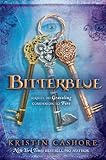Book Review: Graceling, Fire, Bitterblue
I read very quickly, which at least in my case is not really something to brag about. When I’m reading, what I’m doing most of the time is skimming. I don’t seem to have conscious control over this: I fall into a sort of reader’s trance, where I’m building the images of the book in my mind, and I’m not aware of every word as it goes by. (I do seem to slow down for dialogue, which I “hear” in my head, word for word.) I only know that I do this because when I’m reading something that requires careful attention—dense or very stylistic prose—I’ll keep getting tripped up by my tendency to skim ahead. I’ll blink “awake,” out of that reader’s trance, and find that I need to go back half a page to pick up from a point that makes sense. And for a while I’ll go slow and pay attention to every word, but then I drop back into the deep-reading state and I start skimming again.
As a tangent, I think this is the reason that I kind of hate watching videos online. I’m not a big fan of YouTube, and when people link to video clips, I’ll rarely watch them. (Otters are the exception. Always click for otters!) I hate video tutorials too. I was always the kind of student who would have benefited much more from being left in a quiet room with the textbook than from being forced to sit through lectures. I just can extract information so much faster by reading—there’s something kind of painful about being forced to slow down to the speed of video or speech, and my attention tends to wander. Still, I would be a better reader if I could make myself slow down a tad.
Anyway, I finish most books in a few hours. When I’m done I’ll have good recollection of the major points of characterization and plot, but I can easily miss subtle details. What’s more, sometimes my memory of books fades almost in the same way that dreams fade, once you wake up.
When I picked up Bitterblue, which is the third book in a trilogy, I found that I had pretty good memory of the events from the first book (Graceling
), but could recall almost nothing of the second book (Fire
). Fortunately, Bitterblue is a continuation of the story from the first book; characters from the second do show up near the end, but the setting and important players are mostly carried over from the first.
The world of Graceling is kind of a standard Euro-medieval one (I remember feeling like the worldbuilding was a bit thin, in the first book) except that some people are born with special powers, or Graces. These people always have eyes of different colors, like one blue eye and one green, so it’s obvious who the “gracelings” are. Graces can be very specific: there is for example a character in the books who can determine what anybody would most like to eat at a given moment. (I adore this power and want it for myself.) But some people are born with broader Graces. Katsa, the main character of Graceling, has a Grace for killing. This makes her an extraordinarily useful asset of the crown, and while she’s given some status as a result, she’s also not free. The first book follows her struggle for independence and the consequences of her rebellion, and I remember it being a fun, quick read with some genuinely harrowing parts near the end.
I obviously liked Graceling well enough to pick up Fire, which I am going to classify as “forgettable,” as I have forgotten nearly everything about it. (I only remember enough to be sure that I actually did read it!) Bitterblue, though, is something more ambitious. It’s an extended meditation on the aftermath of trauma, almost an elegiac book, where the tension builds less through physical confrontation and narrow scrapes (though there are some of those) but through the nagging, abrasive feeling of things out of place, secrets festering, puzzles lacking pieces, doors lacking keys.
Bitterblue is the young queen of a kingdom that, after the climactic events of Graceling, is recovering from an intense shared trauma. Nearly everyone in the story is scarred in some way. Bitterblue herself lacks parts of her memory. The story follows her struggle to lead her people to healing, while also confronting the growing evidence of a conspiracy within the kingdom to obscure important pieces of the past. I liked Bitterblue as a character, and I found the book a compelling—though, again, sometimes harrowing—read. I’d recommend the trilogy as a whole.













October 6th, 2012 at 11:47 pm
I don’t like video tutorials for the same reason, despite being a slow reader. Ironically, I’ve heard several people remark that they make them that way because it’s quicker than writing things out!